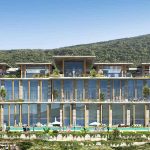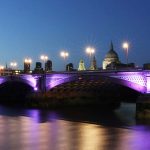Launching Nov 1, the camp brings upscale style—and a light footprint—to the region.
As we make our way on foot along a sandbank in Zambia’s South Luangwa National Park, dozens of Carmine Bee-Eaters, a reddish bird sporting black eyes and a blue crown, cheerfully zip, dip and dive their way into the hundreds of tiny nesting holes carved into the cliffs. “On walking safaris, you see the small things and learn about the things that nature has left behind,” our guide, Abel, said as we made our way around the park that morning. “You see the big things, too, like zebras, giraffes, and elephants, but it’s the small things that really allow you to get a good a look at nature and learn about things you wouldn’t otherwise notice.”

It’s this sort of experience that helped put Zambia on the map as a safari destination—and at the forefront sustainable safari tourism. It was in this very park that bush walks, a clear eco-conscious alternative to motorized game drives, got their start some 60 years ago, as a means of curbing poaching in the area. And it was this type of forward thinking that eventually gave way to the creation of the world’s first carbon neutral national park (the Lower Zambezi) and first sustainable national park (South Luangwa, which was awarded that distinction by the U.N. in 2017), and Africa’s first carbon neutral safari camp, Old Mondoro, operated by Chiawa Safaris.
Born and raised in Zambia, Chiawa Safaris’ owner, Grant Cummings, and his family have been operating safari camps for more than 30 years, and have become some of the chief stewards of conservation in the region. On November 1, in collaboration with Chichele Safaris, Cummings and Chiawa will bring their expertise back to where it all began when they re-launch Puku Ridge, their most luxurious safari camp to date.

Taking its name from the furry orange antelopes that graze the verdant floodplain that fronts the property, Puku Ridge has been completely re-envisioned to include eight luxe, chalet-style tents that, unlike at storied sister properties Old Mondoro and Chiawa Camp in Lower Zambezi, offer more upscale facilities and contemporary style. “This is the culmination of 30-something years of safari experience and a near unlimited budget,” says Cumings. Standout features include indoor and outdoor showers and tubs, rooftop “star beds” for sleeping under the night sky, and private plunge pools that you’ll likely have to share with the visiting baboons, who like to sneak sips of water during the day. USB outlets and even blazingly fast Wi-Fi are also available—although only in guest rooms, as common areas are strictly for socializing. There is also some light air conditioning and a fan set directly over guest beds, thanks to the camp’s proximity to a former presidential summer estate that provides a direct line of power to Puku—a notable perk that sets this apart from other camps in the South Luangwa.

But while Puku certainly ups the luxury game in Zambia, it also adheres with Cumings’ dedication to creating a camp with a lighter footprint, and one that seamlessly blends nature with comfort. Guest tents are kitted out in locally-sourced décor, like tribal textiles made by artisans in nearby Mfuwe, and feature fiber-thatched roofs made entirely out of recycled plastic and composite decking sourced from South Africa. Many of the ingredients for the artfully-prepared cuisine are sourced from markets just outside the National Park. And set directly in front of the main lodge, a large watering hole provides a place for the occasional grazing elephant, lion, warthog, impala, and, of course, puku to seek refuge—all of which you can watch up close from the hide, a subterranean viewing area that overlooks the water.

Cumings is looking forward to growing the eco-safari model even more. “In Lower Zambezi, we have the Zambezi River, which is navigable to do safaris by canoe, and now we’re excited to expand on that notion in South Luangwa, where it all began,” he says. But of course, responsible tourism doesn’t mean you don’t have the option of exploring farther afield. Puku offers twice-daily game drives in custom-designed 4x4s—next year in a new fleet of electric vehicles—and also includes the option of night drives in the park. For all activities, you’ll be accompanied by Zambian expert guides like Abel, whose skills include identifying more that 400 of the 470 species of birds found in the country. Because ultimately, “it doesn’t matter what thread count the sheets are or how fancy the tent, if you don’t have good guides, you’ve got nothing,” notes Cumings. “And we have some the best in the business.” Rates at Puku Ridge start at $810 per person, per night. Multi-camp Chiawa safaris can be booked though preferred operators like The Luxury Safari Company.
Source: Robb Report











